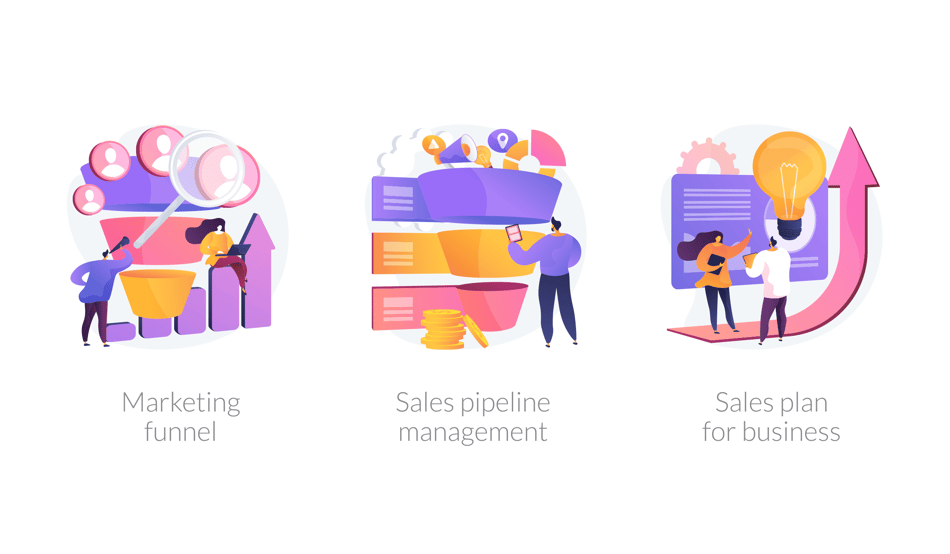Episode 32 - Why Sales Cannot Be a Four Letter Word at Your Bank or Credit Union


Don't Miss An Episode, Subscribe Now

Sales is very necessary for the growth of your financial institution, but how do we achieve that in a way that is authentic, really meaningful, and led by the buyer?
- It starts with employee education on why sales enables your financial institution to give back to your customers and community.
- Be authentic and meet customers where they are in their buyers journey.
- Understand that the buyer's journey is convoluted, and identify the source of leads using sales/marketing tools in order to meet your customers needs.
Transcription:
If you're looking for best practices for your bank or credit union, join us while we talk all things sales, marketing, and strategy for financial institutions. Let's make it happen with FI GROW Solutions.
Meredith Olmstead:
Hi, there I am Meredith Olmstead, founder and CEO of FI GROW Solutions. We are a digital marketing and sales consulting agency, and we work exclusively with banks and credit unions. And I am here with our chief of strategy, Penne Vanderbush. Say hi, Penne.
Penne Vanderbush:
Hey, there.
Meredith Olmstead:
And Penne and I were just having a great conversation around what sales really means or the value of sales for banks and credit unions, specifically community banks and local institutions, or kind of local financial institutions that really have a very strong foot in the door in their regional footprint. And we were talking about kind of, what does it look like? Why is it that some of those places that we work with, some of these clients, really have employees who kind of see sales almost as a four letter word? And why it's really important that we not actually have, or that our clients, if they want to be successful in the long term, not really think of sales as such a shady kind of endeavor.
Meredith Olmstead:
So we were talking about that a lot of people feel like, "Okay, they're just trying to get over on somebody," trying to sell them something they don't need, or maybe acting like a mega bank who is inflating numbers, that we've seen some of those stories in the headlines in years past, of people inflating numbers, or trying to sell people products or services that they don't really need to make a quota. So we're not talking about that kind of sales. But really, we're talking about a necessary part of running a financial institution. That banks and credit unions, no matter how big or how small, they need interest and fee income in order to live up to the brand promises that they're making their customers.
Meredith Olmstead:
I mean, if they're promising, they're going to give better rates. They're promising they might pay a dividend or some other kind of return to their customers, they need that income in order to live up to those promises. And so sales is very necessary for growth of the institution, but how do we achieve that in a way that is authentic, which we hear all the time, but really meaningful and led by the buyer? So we were kind of talking about that. I don't know, like how you want to kind of jump into this again, Penne, because it's such an important conversation to have around the real positive value of sales for these institutions.
Penne Vanderbush:
Yeah. I mean, I think it starts a lot with employee education. There are a lot of employees who do feel like sales is a four letter word, or maybe they've come from a job in the past, whether it's banking or retail or otherwise, where they were forced to make quotas or numbers, so they already have that negative impression. And I think you really hit the nail on the head with helping them understand that you need that income to do business. You can't pay those higher deposit, dividends and rates, the yields in the deposit side, if you don't have the money to do that. You can't donate to your communities and get involved and do all of those things that a local institution promises to do if you don't have the funds to do that. So helping them understand, it's really the fuel for the amazing stuff that you do every day.
Penne Vanderbush:
So I think starting employee education and maybe resetting some mindsets or previous thoughts around the topic is definitely a great place to start. Being authentic, we talk about this all the time, being authentic in that sales process a hundred percent. And I think a lot of it too is meeting people where they're at in their buyer's journey. So one thing that we've noticed with sales is tracking is difficult. It's really hard for a lot of institutions. They don't really have the best tools for tracking. But when you do track your marketing to sales, and your following customer journeys, and you're trying to make heads tails of what's working and what's not working.
Penne Vanderbush:
We were recently in a portal the other day that we were just discussing where we were looking at a marketing email that went out, it highlighted one or two products that was offered by the institution. And we immediately found four contacts who clicked on that email for those products, but ultimately navigated the site and applied for completely different products. And so when you're tracking sales metrics, it's important that you look at your marketing communication holistically. If you sent a marketing email about a credit card, for example, you don't only look for the straight line where somebody came in and applied for a credit card. You also want to look at all of the other customers or members who clicked in that email and ultimately applied for any other product.
Penne Vanderbush:
And then it's important for your sales team to understand that someone applying for a product didn't necessarily start with a marketing email for that product or a direct line in. Buyer's journeys are convoluted. There's a lot of back and forth. And so that's where it's really important for sales teams to be helpful and understand where that customer is coming from in that journey. And it's important to make sure that you're tracking lines up so that you recognize those successes for your sales and marketing teams.
Meredith Olmstead:
Yeah, absolutely. I even was having a conversation with a different client this morning about some results from a HELOC paper click campaign. And he was actually looking at his conversions and noticing that a number of them had also cross-sold, the leads had been cross-sold into savings and checking accounts. So whether or not they had actually even closed a HELOC, wasn't just the only impact. He wasn't even a hundred percent sure that the HELOC was really the product that brought the person in the door, but sometimes they come through a different way.
Penne Vanderbush:
Absolutely.
Meredith Olmstead:
I think that's really important when talking with sales people who are doing manual follow up with digital leads as well, that they have the ability to go in in a good CRM, you can go in and actually see where your sales leads are navigating in your emails. What are they clicking on? Where they're going on your websites. What eBooks or pages they're visiting. And that can give you a real sense of what other kinds of products or services they might be interested in. So definitely letting the buyer lead the way and getting as much context, excuse me, as you can when you're following up is really important.
Penne Vanderbush:
A hundred percent. And you had a great blog stat that you were sharing. What was that blog stat that you had regarding that content?
Meredith Olmstead:
Well, I did note we did run some lists for a different client. So we're talking at least three different institutions now, in three different marketplaces, where 50 or 60% of their known contacts who had deals, had consumed blog content on their website. So you know that these people are open to more information. They are definitely consuming educational, informative content, because blogs are not really just about selling a product or service. They're about how to make, or they should be, about how to make wise financial product and service decisions, or about how to save money or how to find the house of your dreams, or what's a checklist for going and buying your first car.
Meredith Olmstead:
All that kind of helpful content that people are consuming in their buying journey. And if you know they're doing that, you offer that to them, and it helps to make the sales process more authentic for both people involved and just more effective in general. That's why we always say, "Be authentic," even though it's kind of cliche, it really is important.
Penne Vanderbush:
And if you're on a sales team, understanding that content does drive leads, it does help people on that buyer's journey, but it really is part of the sales process. And I think a lot of the times content is marketing, blogging is marketing. There's this siloed approach. And we really encourage sales teams, get involved with the content. Even if you're not writing it, kind of like outline it or bullet point it, because your piece of content from your eyes, from your expertise, you can write that in position that differently than those that don't have that experience. So you can also contribute to really valuable content that goes out in emails or blog posts or guides or eBooks that will speak to the buyer and help them along their way.
Penne Vanderbush:
So I think it's important for sales teams to realize what their tools are. I think sales tools are often, what is the CRM we're looking at? What is the software? And often, many of these valuable sales tools are brushed aside as that's marketing. And really combining marketing and sales efforts will be huge in that. And once you start to create that, I think this is where that sales being a four letter word isn't even in your mind anymore. Because now you've created such a phenomenal journey or a series of journeys for people to come in through educational content, authentic help, you're tracking it well. And you're bringing that income to the bottom line, which you need to fulfill your mission and community involvement. So it all comes full circle, and it should alleviate any concern that sales is a negative or a four letter word.
Meredith Olmstead:
Yeah. Absolutely, absolutely. When I work with digital sales teams, I have another team that I've been working with, we've been building templates for their follow ups with leads. And then every template, especially the first one or two, they don't even try to really sell the product or service. They are simply sharing more information, more content, more blogs, helpful blogs that have some kind of added value or tips that they can put right in the email themselves to give some added value to their leads. So very important in the sales process.
Meredith Olmstead:
So absolutely, thank you so much for a great conversation. And hopefully, you all will take something from this back to your sales team and driving really great and valuable sales conversations and helping them feel good about what they're doing, not just about trying to close the deal. And so if you want any more information, we have a lot of great resources on our website, case studies, as well as lots more podcasts and blogs on various topics for marketing for financial institutions. And in the meantime, let's just all get out there and let's make it happen.








Blog comments